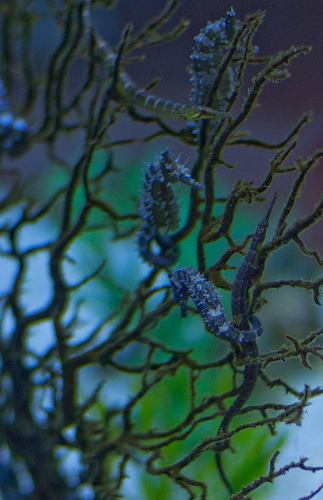Be glad that you are alive and your parents love you, because some other parents don’t. They eat their babies instead. It seems like fathers in male pregnancies may be more inclined to eat their babies if their mothers are ugly. A case in point is the Gulf pipefish (Syngnathus scovelli).
Found in seagrass beds and other densely vegetated shallow grounds, the Gulf Pipefish is a freshwater fish that lives as long as three years, and is the only known species among 24 North American pipefish that enters freshwaters.  Characteristic of the pipefish is the slim body, a snout, and usually only dorsal fins for movement, making it look almost a swimming pencil that bends at the end. Male pregnancy amongst the Gulf pipefish means that fertilization only happens after the female deposits her eggs in the male’s brood pouch. The father then nurtures the embryos in his brood pouch until parturition.
Characteristic of the pipefish is the slim body, a snout, and usually only dorsal fins for movement, making it look almost a swimming pencil that bends at the end. Male pregnancy amongst the Gulf pipefish means that fertilization only happens after the female deposits her eggs in the male’s brood pouch. The father then nurtures the embryos in his brood pouch until parturition.
It seems like female beauty in the eyes of Gulf pipefish is size. Smaller females (93-106mm) were consistently discriminated against in favor of larger ones (108-122mm) in a 2010 study by Texas A&M. The study suggests that bigger mothers transfer more eggs each copulation, and more of their babies are stronger and develop fully into parturition. Since males cannot alter their level of investment in a brood, eggs from larger mothers seem to be a more resource-efficient way of parenting.
The sex ratio amongst Gulf pipefish favors females in reproduction, so what happens when a male has already mated with a smaller, thus less attractive, female? He can reduce nutrient flow to the brood to mediate this energetically costly pregnancy, so that siblings compete for survival. This isolation is not so much passive as it is cannibalistic – Sagebakken et. al’s recent study in a similar species found that the father can absorb embryonic nutrients through the brood pouch to his liver and muscle tissue.
Infant-eating amongst animals remains much a controversy. This hypothesis that fathers kill in order to preserve his resources for the next pregnancy in hope of increasing net reproductivity has been criticized by Klug, Lindström, and Mary for being applicable to only some species. After all, it is possible that Daddy kills some babies to modulate their siblings’ competition for resources.
References
Klug, Hope, Kai L Lindström & Colette M. St. Mary, 2006. Parents Benefit from Eating Offspring: Density-dependent Egg Survivorship Compensates for Filial Cannibalism. Evolution 60(10): 2087-2095.
“Male Pregnancy: The Dark Side,” by Nature. Scientific American, March 17, 2010. URL: http://www.scientificamerican.com/blog/post.cfm?id=pregnant-male-fish-can-choose-to-ma-2010-03-17 (accessed April 8, 2010).
Paczolt, Kimberley A. & Adam G. Jones. Post-copulatory sexual selection and sexual conflict in the evolution of male pregnancy. Nature 464: 401-404.
Sagebakkne, Gry, Ingrid Ahnesjö, Kenyon B. Mobley, Inês Braga Gonçalves & Charlotta Kvarnemo, 2010. Brooding fathers, not siblings, take up nutrients from embryos. Proc. R. Soc. B 277: 971-977.
“Syngnathus scovelli.” Smithsonian Marine Station at Fort Pierce. URL: http://www.sms.si.edu/IRLspec/Syngna_scovel.htm (accessed on April 9, 2010).
